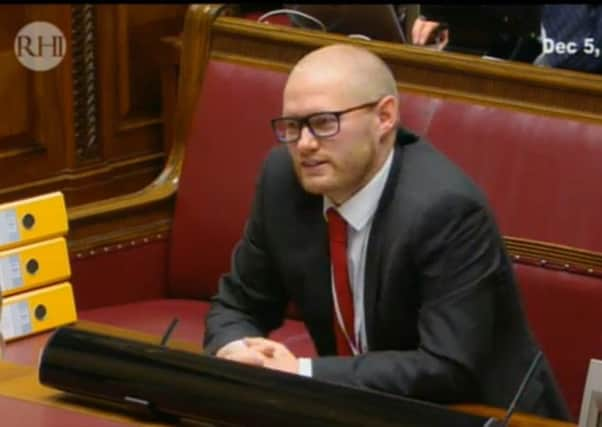Key official in set up of RHI was put forward for bonuses due to work


Peter Hutchinson, who was in the Department of Enterprise, Trade and Investment’s (DETI) energy division when the scheme was evolving between 2010 and 2012, yesterday spent an entire day giving evidence in Stormont’s Senate Chamber, where the inquiry hearings are being held.
During his questioning of Mr Hutchinson, Donal Lunny, junior counsel to the inquiry, commented on his modesty, saying that documents released to the inquiry show that his superior had recommended him for a bonus, saying that he had “performed exceptionally well” and had “worked largely on his own” managing the consultants CEPA who it is now clear provided flawed advice on whether and how an RHI scheme should be set up.
Advertisement
Hide AdAdvertisement
Hide AdThe bonus citation also referred to him having “consistently gone the extra mile” and being in “a very heavily loaded post”, something which backs up what the inquiry has heard from other witnesses about the lack of resources within the section of the department dealing with the setting up and running of the scheme.
Last week CEPA told the inquiry that the DETI officials with whom they were dealing knew more than them about renewable heat at the point where they were engaged to provide expert advice on setting up the scheme.
But Mr Hutchinson – CEPA’s main contact within the department – said yesterday that he was a “generalist” within the civil service who had an arts degree and was not an energy expert, even though in several years he learned quite a lot about energy policy.
In response to a question from panel member Dame Una O’Brien, Mr Hutchinson said he believed he had only met Arlene Foster, the then minister, twice in formal meetings during his five years in the department. He said that was “not particularly unusual, given where I was [in the hierarchy]” and that his boss, Fiona Hepper, would have spoken to him about an issue and then spoken to the minister.
Advertisement
Hide AdAdvertisement
Hide AdDame Una asked him whether, as the person who was aware of the fine detail of the RHI scheme, “did you ever think ‘I could go along to that meeting’”. Mr Hutchinson responded that he did not think that he had thought in those terms, because “a senior officer was over the detail” and would brief the minister.
In many hundreds of pages of written evidence to the inquiry, Mr Hutchinson said that he was not aware of any inappropriate lobbying by ministers, Spads, officials or others in relation to the scheme.
He said: “To my knowledge, there were absolutely no instances of lobbying as described in the question.
“I would have had infrequent dealings with the minister’s special advisor, Dr Andrew Crawford.
Advertisement
Hide AdAdvertisement
Hide Ad“This would have been in the form of very occasional telephone call or chance meeting within the building... at no stage was there any lobbying.”
Mr Hutchinson will return to continue giving evidence on Friday. Today the inquiry will hear from other officials involved in the early stages of the scheme.
WITNESS REVEALS JUST HOW LOW UPTAKE OF SCHEME WAS:
There was a very low uptake of the RHI scheme right at the start, Peter Hutchinson has told the inquiry in his written statement.
He said that because the scheme had been in development for several years and had been announced publicly by Arlene Foster two years before it opened, “there was an expectation that there would be some applications for support from day one of the scheme – this was not the case”.
Advertisement
Hide AdAdvertisement
Hide AdHe said: “The first applications did not occur until February, over three months after launch. In the first six months of the scheme, there were 11 applications (less than two a month on average) and in the first year there were 56 (less than five a month of average).
“This was perceived as low interest and led to underspends in the budget in 2012/13 and 2013/14.
“We continued to promote the scheme.”